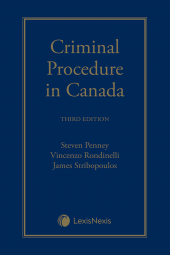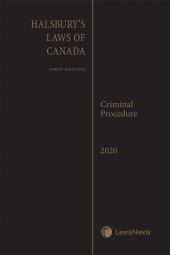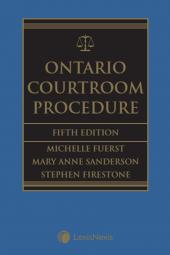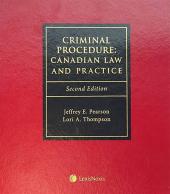Criminal Procedure in Canada, 3rd Edition
One Year Subscription Only Terms
Subscribers receive the product(s) listed on the Order Form and any Updates made available during the annual subscription period. Shipping and handling fees are not included in the annual price.
Subscribers are advised of the number of Updates that were made to the particular publication the prior year. The number of Updates may vary due to developments in the law and other publishing issues, but subscribers may use this as a rough estimate of future shipments. Subscribers may call Customer Support at 800-833-9844 for additional information.
Subscribers may cancel this subscription by: calling Customer Support at 800-833-9844; emailing customer.support@lexisnexis.com; or returning the invoice marked 'CANCEL'.
If subscribers cancel within 30 days after the product is ordered or received and return the product at their expense, then they will receive a full credit of the price for the annual subscription.
If subscribers cancel between 31 and 60 days after the invoice date and return the product at their expense, then they will receive a 5/6th credit of the price for the annual subscription. No credit will be given for cancellations more than 60 days after the invoice date. To receive any credit, subscriber must return all product(s) shipped during the year at their expense within the applicable cancellation period listed above.
Product description
This book provides a comprehensive overview of the criminal process, explaining the rules of criminal procedure clearly and concisely. It is an ideal companion for prosecutors, defence lawyers, law students, and judges.
What's Unique About This Book?
- Easy to use – Chapters are ordered chronologically, structured to mirror the various stages of the criminal process, from investigation and pre-trial procedures to the trial, sentencing, and appeals.
- Ideal for novices and experts – The book provides the novice with the context necessary to appreciate the significance of the rules of criminal procedure, while digging deep on specifics so that experts will find the book an invaluable resource.
- Forward looking – Where there are gaps in the existing rules governing the criminal process, the authors make suggestions as to how they could best be filled. The authors also offer constructive criticism of existing rules in the hopes of advancing future reform.
- Treatment of the Charter – Rather than treating the Charter as a separate topic, constitutional issues are infused throughout the book, and are discussed in the various contexts of criminal procedure.
- Balanced perspective – The authors draw on their varied experiences in academia, on the bench, and within the bar to insightfully explain how the Charter of Rights and Freedoms, statutes, and case law all come together in Canada’s criminal procedure rules.
What's New In This Edition
This third edition is fully updated to account for all major developments in the legislation and case law, including discussion of a number of significant Supreme Court of Canada decisions that have an impact on the criminal process, including search and seizure, investigative detention, questioning, bail, trial within a reasonable time, Charter remedies, sentencing, and more. The third edition also addresses the effects of the COVID-19 pandemic on criminal procedure, including bail, trial procedure, and sentencing.
Who Should Read This Book?
- Prosecutors and Defence lawyers – Both veteran and novice criminal lawyers will find the text to be a concise resource on issues they grapple with on a daily basis, while the exhaustive footnotes will serve as a resource for more in-depth research.
- Judges – Members of the judiciary will be able to conveniently refer to the specific chapter that applies in a given criminal proceeding, benefiting from the extensive case references and fulsome discussion of the rules of criminal procedure and constructive suggestions on navigating gaps in existing rules.
- Justices of the Peace – Justices of the Peace will find this work invaluable, as it addresses all aspects of their role within the criminal justice system, including a detailed discussion regarding search warrants and their issuance, intake procedures, and bail.
- Law students – Law students will find the overview of the Canadian criminal process useful to their study of the criminal justice system in Canada, while appreciating how complex areas of criminal procedure are explained concisely and logically.
- Law libraries – This work will be a central part of any collection on Canadian criminal law and procedure.
- Criminologists – Criminologists will find this book to be a comprehensive reference guide on the formal rules of the Canadian criminal process.
Table of contents
Chapter 1: An Overview of Criminal Procedure and Basic Concepts
Chapter 2: Detention and Arrest
Chapter 3: Search and Seizure
Chapter 4: Questioning
Chapter 5: Intake Procedures
Chapter 6: Bail
Chapter 7: Disclosure
Chapter 8: Prosecutorial Function
Chapter 9: Elections, Preliminary Inquiries, and Preferring the Indictment
Chapter 10: Remedies
Chapter 11: Informations and Indictments
Chapter 12: Territorial Limits
Chapter 13: Temporal Limits
Chapter 14: The Plea
Chapter 15: Jury Selection
Chapter 16: Trial Procedure
Chapter 17: Sentencing
Chapter 18: Appeals
 Lexis Nexis
Lexis Nexis 


